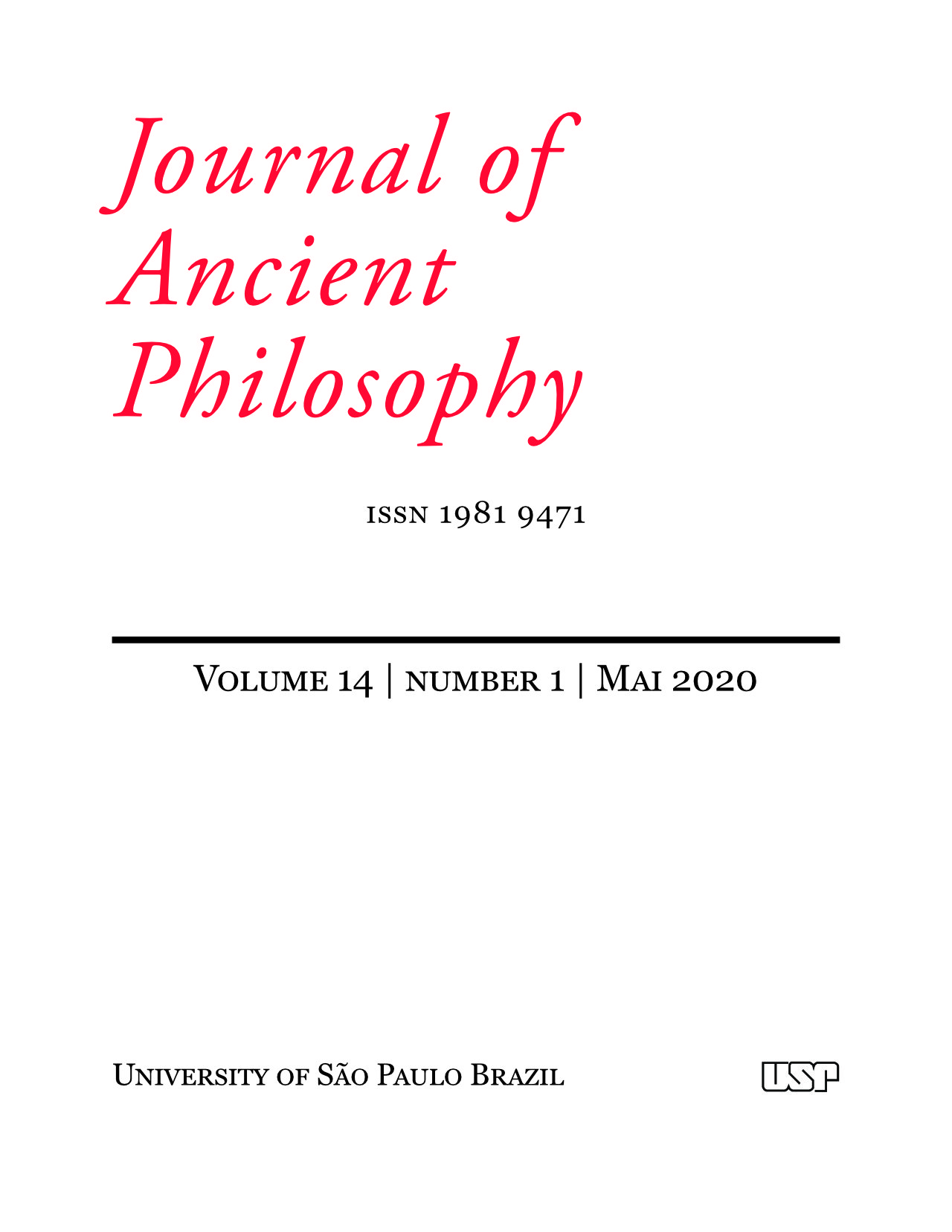Divinity, Noēsis, and Aristotelian Friendship
DOI:
https://doi.org/10.11606/issn.1981-9471.v14i1p01-29Keywords:
friendship, Aristotle, divinityAbstract
Aristotle's NE X claim that the best human life is one devoted to contemplation (theoria) seems in tension with his emphasis elsewhere on our essentially political nature, and more specifically, his claim that friendship is necessary for our flourishing. For, if our good can be in principle realized apart from the human community, there seems little reason to suggest we 'need' friends, as he clearly does in NE VIII & IX. I argue that central to Aristotle's NE X discussion of contemplation is the claim that our chief good accords with whatever is 'most divine' in us, viz. our rational nature (NE 1177b2-18). Thus, the best human life involves the excellent exercise of our rational capacities. I distinguish two ways in which human beings flourish through exercising their rationality. The first is in the activity of theoria. The second, I argue, can be found in the virtuous activity of complete friendship (teleia philia). For Aristotle the truest form of friendship is an expression of rationality. It is characterized not merely by our living together, but conversing, and sharing one another's thoughts (NE 1170b12-14). Examining Aristotle's notion of a friend as 'another self (alios autos), I argue that through friendship human beings come to better know themselves and the world in which they live. Complete friendship involves a (uniquely human) second-order awareness of oneself in another, and through this awareness our understanding of ourselves and the world in which we live is enriched, confirmed, and enjoyed through the presence of other minds. Thus, the highest form of Aristotelian friendship is an intellectual activity through which we attain an analogue of the divine contemplation of the unmoved mover, thereby living with respect to what is most divine in us, but doing so in accordance with our uniquely rational-political nature.
Downloads
References
Aristotle (1962) Aristotelis Ethica Nicomachea, I. Bywater (ed.), (London: Oxford University Press).
Aristotle (1984) The Complete Works of Aristotle, J. Barnes (ed.), (New Jersey: Princeton University Press).
Aristotle (2002) Nicomachean Ethics, C. Rowe (trans.), (Oxford: Oxford University Press).
Broadie, S. (1987) "The Problem of Practical Intellect in Aristotle's Ethics," Proceedings of the Boston Area Colloquium in Ancient Philosophy 3: 229-52.
Broadie, S. (1991) Ethics with Aristotle (Oxford: Oxford University Press).
Kraut, R. (2018) "Aristotle's Ethics," Stanford Encyclopedia of Philosophy: https://plato.stanford.edu/entries/aristotle-ethics/
Lennox, J. (2001) Aristotle's Philosophy of Biology: Studies in the Origins of Life Science (Cambridge: Cambridge University Press).
Nagel, T. (1981) "Aristotle on Eudaimonia," in Amelie Rorty (ed.), Essays on Aristotle's Ethics (Los Angeles: University of California Press), 7-14.
Robinson, D. (2004) "Aristotle on the Perfect Life," in The Great Ideas of Philosophy. (The Teaching Company, LLC).
Rorty, A. (1981) "The Place of Contemplation in Aristotle's Ethics," in Amelie Rorty (ed.), Essays on Aristotle's Ethics (Los Angeles: University of California Press). 377-94
Shields, C. (2016) "Aristotle's Psychology," Stanford Encyclopedia of Philosophy: https://plato.stanford.edu/entries/aristotle-psychology/
Stern-Gillet, S. (1995) Aristotle's Philosophy of Friendship (New York: State University of New York Press).
Downloads
Published
Issue
Section
License
Copyright
Authors who publish with this journal agree to the following terms:
- Authors retain copyright and grant the journal right of first publication with the work simultaneously licensed under a Creative Commons Attribution License (CC By 4.0) that allows others to share the work with an acknowledgement of the work's authorship and initial publication in this journal.
- Authors are able to enter into separate, additional contractual arrangements for the non-exclusive distribution of the journal's published version of the work (e.g., post it to an institutional repository or publish it in a book), with an acknowledgement of its initial publication in this journal.
- Authors are permitted and encouraged to post their work online (e.g., in institutional repositories or on their website) prior to and during the submission process, as it can lead to productive exchanges, as well as earlier and greater citation of published work (See The Effect of Open Access).


